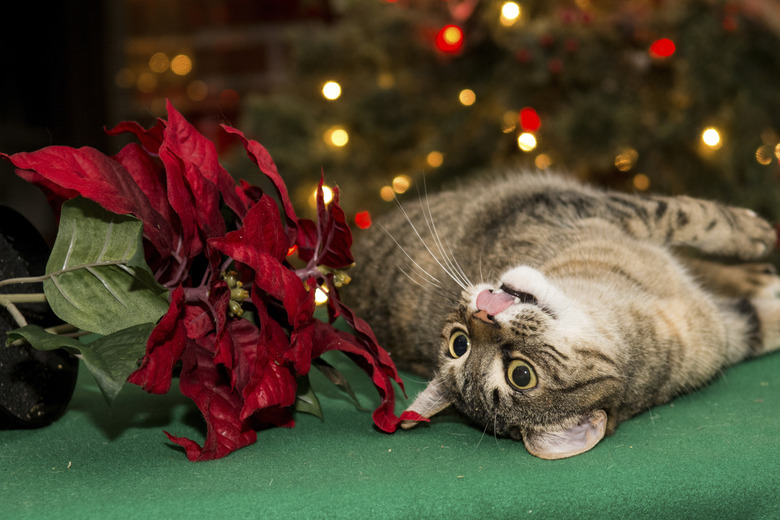Are Poinsettias Poisonous To Cats?
Poinsettias are commonly called poisonous to pets, but they are usually not deadly. In fact, poinsettias are only mildly toxic to cats. Still, if you suspect that your cat has been chewing on a poinsettia or another holiday plant, it might be a good idea to take him to a veterinarian for a checkup.
Poisonous poinsettia?
Poisonous poinsettia?
Although poinsettias can cause mouth and stomach irritation, according to the Pet Poison Helpline, the level of toxicity to cats is usually mild to low. The poisonous part of the plant is the milky white sap found inside leaves and flowers. This sap can cause skin irritation if it comes in contact with the skin and can cause internal irritation if ingested.
Signs of poinsettia poisoning
Signs of poinsettia poisoning
Some cats might experience vomiting after chewing and swallowing parts of a poinsettia, reports the ASPCA. Very rarely, ingestion can also cause diarrhea and drooling. The sap can also irritate the skin if it comes in contact with it. Skin contact can cause itchiness and redness, while eye contact might lead to a mild case of conjunctivitis or eye irritation.
When to see the vet
When to see the vet
Contact your veterinarian if the symptoms of poinsettia toxicity do not resolve or if they are severe. For example, the FDA recommends that cats who continue to vomit several hours after consuming poinsettia need a vet's evaluation to rule out more serious problems. This is especially true in the case of kittens or older cats with compromised immune systems.
Other holiday plants to avoid
Other holiday plants to avoid
Other plants, including mistletoe, holly, and amaryllis are toxic to cats. Mistletoe can lower blood pressure to dangerous levels, slowing heart rate in the process. It can also cause abdominal problems, including diarrhea and vomiting. Holly can cause vomiting, diarrhea, drooling, and decreased activity. Kitty should also stay away from amaryllis, which can cause abdominal discomfort, including vomiting. Some cats also experience stomach discomfort and drooling after consuming amaryllis.
The best way to avoid any possible injury to your cats this holiday seasons is to decorate with artificial plants or to put any live plants out of reach of your cat, and if you suspect your cat has eaten any mistletoe, holly, or amaryllis or has been in prolonged contact with poinsettias, you should seek a veterinarian immediately.
Always check with your veterinarian before changing your pet's diet, medication, or physical activity routines. This information is not a substitute for a vet's opinion.
